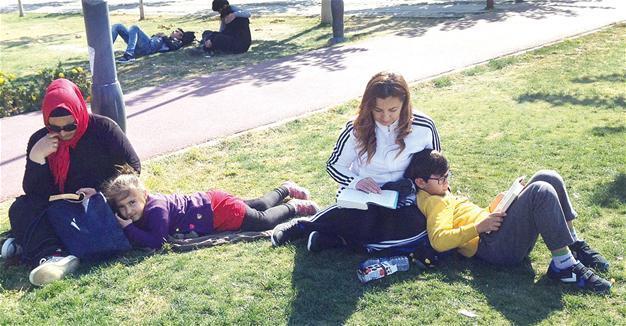İzmirians hold reading festival despite low reader numbers
Nazlan Ertan - İZMİR

About 50 people, mostly young and mostly women, are lying on the grass on the Kordon, the coastal front at the center of İzmir, reading their books. It is Oct. 30, İzmir’s Book Reading Festival, a spontaneous festival that surfaced on social media. It is strikingly simple – with no activities or sponsors: “Just bring your book, a cushion and a cup of coffee.”
It is a beautiful day; mothers have dragged along their little children. A group of women say they have come together from Gaziemir, one of the poorer suburbs of the city. Two women, one uncovered and the other wearing a dark red headscarf, are reading a bit far away with their kids, too. One is reading the recent bestseller, Elif Şafak’s “Daughters of Eve” – a book that explores religion and the bourgeoisie through the eyes of three different women. The woman wearing the red headscarf is reading Maksim Gorki’s “Mother.” Other book titles include William Golding’s “Lord of the Flies” and Turkey’s new-generation writer Emrah Serbes ‘“Müptezeller” (The Addicted).
İzmirians like to boast that their city, which has a reputation for prestigious high schools and universities, reads more than the rest of the country. The İzmir Book Fair, a seven-day affair that takes place every year in April, has brought together writers, publishers and authors over the last two decades. It is the little sister to Turkey’s largest book fair, in Istanbul, which starts in mid-November.
The city has also been the hometown of many great writers, from İhsan Oktay Anar, whom many people deem worthy of a Nobel prize “if only his complicated and playful use of Turkish could be translated” to Ece Temelkuran, the angry young woman who recently authored “Turkey: The Insane and the Melancholy.”
But despite all these, when it comes to actual books read and public libraries visited, the numbers show the reality. İzmir hardly rates better than the rest of Turkey, which, to say the least, is not a country of readers.
According to a report prepared by the Culture Ministry in 2011, titled “The Reading Culture Map of Turkey,” possibly the first in-detail research on Turks’ reading habits, the average Turk reads 7.2 books a year. A more recent report, prepared by the Turkish Publishers’ Union in 2015, says that this has now increased to eight books a year. Another study, carried out in 2015 by internet publisher Libronet, claims that Turks read 11.6 books per capita, but many publishers would dismiss this number as “overtly optimistic” though many are stuck by its other findings.
When compared to other countries, Turkey’s average of six hours of reading per week falls painfully short of eleven hours put forward by the Indians – the world’s top readers. Thailand, China, the Philippines and Egypt make up the top readers. Turkey’s 5 hours and 54 minutes are in line with Argentina and Spain.
Again, according to global statistics, the number of books published each year for one million people in Turkey is 570, considerably lower than two of its neighbors Greece (870) and Bulgaria (820). France publishes 1,010 books for one million people and Italy 1,020.
Some 68 percent of Turks say they read, but most of them read irregularly and randomly, according to the Reading Culture Map. The regular readers are mostly urban dwellers, educated and young. According to both the Culture Map and Libronet, young people between the ages 7 and 24 read more than older people. So much for wishing to save all your favorite books for retirement!
The thought of reading by the sea may be your idea of heaven, but almost all statistics show that coastal areas read less. The Libronet survey has found that Istanbul reads more than İzmir, and Ankara reads more than Antalya.
Sea, sand and romance? This is still another myth. Residents of coastal areas are more adventurous, whereas Istanbulites prefer romance.
 About 50 people, mostly young and mostly women, are lying on the grass on the Kordon, the coastal front at the center of İzmir, reading their books. It is Oct. 30, İzmir’s Book Reading Festival, a spontaneous festival that surfaced on social media. It is strikingly simple – with no activities or sponsors: “Just bring your book, a cushion and a cup of coffee.”
About 50 people, mostly young and mostly women, are lying on the grass on the Kordon, the coastal front at the center of İzmir, reading their books. It is Oct. 30, İzmir’s Book Reading Festival, a spontaneous festival that surfaced on social media. It is strikingly simple – with no activities or sponsors: “Just bring your book, a cushion and a cup of coffee.”